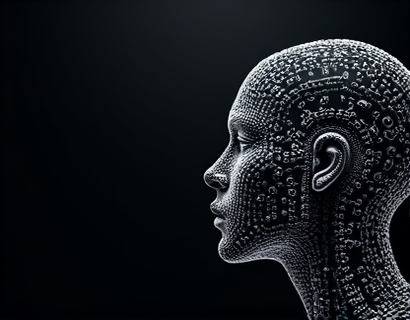Crypto AI Marketing Dynamics: Transforming Digital Engagement for Next-Gen Ecosystem Solutions
The intersection of cryptocurrency and artificial intelligence (AI) is giving birth to a new era in digital marketing, one that promises to revolutionize how businesses engage with their audiences and foster growth. This article delves into the cutting-edge strategies that leverage blockchain and machine learning to create a more interactive and effective online ecosystem. Ideal for tech-savvy innovators and early adopters, these next-gen solutions are designed to drive engagement and enhance user experience seamlessly.
Understanding the Convergence of Crypto and AI
The fusion of cryptocurrency and AI is not merely a technological curiosity but a powerful synergy that can transform various aspects of digital marketing. Cryptocurrency, with its decentralized and secure nature, provides a robust foundation for transactions and data management. AI, on the other hand, brings the capability to analyze vast amounts of data, predict user behavior, and personalize experiences at an unprecedented scale.
When combined, these technologies can create a marketing ecosystem that is both transparent and highly adaptive. For instance, blockchain ensures that user data is securely stored and managed, while AI algorithms can process this data to offer tailored content and offers. This dual approach not only enhances trust and security but also significantly improves the relevance and effectiveness of marketing efforts.
Enhanced User Engagement Through Blockchain
One of the most significant advantages of using blockchain in digital marketing is the enhancement of user engagement. Traditional marketing often struggles with issues of trust and data privacy, which can lead to user disengagement. Blockchain technology addresses these concerns by providing a transparent and immutable ledger for all transactions and interactions.
For example, loyalty programs can be reimagined using blockchain to ensure that rewards are securely and transparently distributed. Users can track their points and rewards in real-time, and the system can automatically execute transactions without the need for intermediaries. This not only streamlines the process but also builds a stronger connection between the brand and the user, fostering long-term engagement.
AI-Driven Personalization
AI plays a pivotal role in personalizing the user experience, a critical factor in today's competitive digital landscape. By analyzing user behavior, preferences, and interactions, AI can create highly personalized content and recommendations. This level of personalization goes beyond simple A/B testing and generic segmentations, offering a more nuanced and dynamic approach to user engagement.
For instance, AI can analyze a user's browsing history, purchase patterns, and social media activity to curate a unique feed of content and offers. This not only increases the likelihood of user interaction but also enhances the overall user experience. Moreover, AI can predict user needs and preferences, allowing brands to proactively address customer demands before they even arise.
Predictive Analytics and Decision Making
Predictive analytics, powered by AI, is another game-changer in the realm of digital marketing. By leveraging machine learning algorithms, marketers can forecast user behavior and market trends with remarkable accuracy. This foresight enables businesses to make data-driven decisions, optimizing their marketing strategies and resource allocation.
For example, predictive analytics can identify which users are most likely to convert, allowing for targeted campaigns that maximize ROI. It can also predict which content types and channels will perform best, ensuring that marketing efforts are focused and effective. This level of precision not only improves campaign performance but also reduces waste and inefficiency.
Automated Marketing Processes
Automation is a key benefit of integrating AI into digital marketing. Repetitive and time-consuming tasks can be automated, freeing up marketers to focus on strategic initiatives. AI can handle everything from email marketing and social media management to customer service and lead nurturing.
For instance, chatbots powered by AI can provide instant customer support, answering common queries and guiding users through the buying process. This not only enhances user satisfaction but also reduces the workload on human support teams. Additionally, AI can optimize ad placements and bidding in real-time, ensuring that ads reach the most relevant audience at the best possible cost.
Building Trust Through Transparency
Trust is a fundamental component of any successful marketing strategy, and blockchain technology excels in building and maintaining trust. By providing a transparent and tamper-proof record of all transactions and interactions, blockchain ensures that users can verify the authenticity and integrity of the brand's actions.
This transparency can be particularly beneficial in industries where trust is paramount, such as finance and healthcare. For example, a financial service provider can use blockchain to demonstrate the secure and transparent handling of user funds, thereby attracting and retaining customers who value security and reliability.
Enhancing Content Relevance with AI
AI-driven content recommendation systems can significantly enhance the relevance and engagement of digital content. By analyzing user interactions and preferences, these systems can suggest articles, videos, and other content that are most likely to resonate with each individual user.
This personalized content delivery not only keeps users engaged but also increases the chances of conversion. For instance, a news platform can use AI to recommend articles based on a user's reading history and interests, keeping them on the site longer and increasing the likelihood of subscriptions or ads being clicked.
Fraud Detection and Prevention
Fraud remains a significant challenge in digital marketing, affecting both brands and users. AI algorithms can detect and prevent fraudulent activities with high accuracy, protecting both parties involved. By analyzing patterns and anomalies in user behavior and transaction data, AI can identify potential fraud in real-time and take corrective actions.
For example, AI can flag suspicious login attempts or unusual spending patterns, alerting the relevant teams to investigate and mitigate the risk. This proactive approach not only safeguards user data but also builds trust and credibility for the brand.
Scalability and Flexibility
The combination of blockchain and AI offers unparalleled scalability and flexibility in digital marketing. As user bases grow and market conditions change, these technologies can adapt and scale seamlessly, ensuring that marketing strategies remain effective and efficient.
Blockchain's decentralized nature means that the system can handle increasing amounts of data and transactions without compromising performance. AI, with its ability to learn and improve over time, can continuously optimize marketing processes, adapting to new trends and user behaviors.
Case Studies and Real-World Applications
Several brands and platforms have already begun to leverage the power of crypto AI in their marketing efforts, achieving notable success. For instance, a leading cryptocurrency exchange used AI to enhance user onboarding and account management, resulting in a significant reduction in user churn and an increase in active traders.
Another example is a content platform that implemented AI-driven content recommendation systems, leading to a 30% increase in user engagement and a 20% rise in ad revenue. These case studies demonstrate the tangible benefits of integrating blockchain and AI in digital marketing.
Challenges and Considerations
While the potential of crypto AI in digital marketing is vast, there are several challenges and considerations that businesses must address. One of the primary concerns is the technical complexity involved in implementing these technologies. Businesses need to invest in skilled personnel and robust infrastructure to fully harness the benefits.
Additionally, regulatory compliance is a critical factor, especially when dealing with cryptocurrency. Ensuring that marketing practices align with legal requirements and user privacy standards is essential to avoid potential legal issues and maintain user trust.
Future Trends and Innovations
The future of crypto AI in digital marketing is promising, with several emerging trends and innovations on the horizon. One such trend is the integration of decentralized finance (DeFi) platforms, which can offer new avenues for user engagement and financial inclusion.
Another area of interest is the use of non-fungible tokens (NFTs) for creating unique and verifiable digital assets, opening up new possibilities for brand engagement and customer loyalty programs. As these technologies continue to evolve, businesses that embrace them early will likely gain a competitive edge in the market.
Conclusion
The convergence of cryptocurrency and AI is transforming digital marketing in profound ways, offering unprecedented opportunities for engagement, personalization, and efficiency. By leveraging blockchain for transparency and security, and AI for data-driven insights and automation, businesses can create a more interactive and effective online ecosystem. For tech-savvy innovators and early adopters, embracing these next-gen solutions is not just an option but a necessity to stay ahead in the rapidly evolving digital landscape.










































